Redditor Tries To Steal Her Friend's Dog After Noticing The Abuse And Neglect The Poor Pup Is Going Through
A felony is imposed on anyone who commits animal cruelty under state laws. However, if the authorities are unaware of the crime, the law cannot be enforced.
Animals will always rely on people to protect them by ensuring that any abuse they might encounter is reported. The most common form of animal cruelty results from neglect; direct violence is less frequent and occurs much less often.
Animal cruelty can sometimes be difficult to recognize. You may suspect an animal is being mistreated, but you can never know for certain.
According to animal control officers, failure to provide basic needs for an animal or neglect constitutes the vast majority of cruelty cases. Hoarding is also a form of neglect, as well as the lack of veterinary care, shelter, and abandonment.
Helping an animal in need should be a priority in your life, especially when they are attacked or beaten. The best course of action is to involve law enforcement as quickly as possible without resorting to violence.
A Redditor who goes by the username u/PatientSpecific6598 made a post on the r/AmItheA**hole subreddit, where she explained how she attempted to kidnap her friend's dog after noticing the neglect it was experiencing. Scroll down to check out the full Reddit post!
Here's the original post by Reddit user u/PatientSpecific6598:
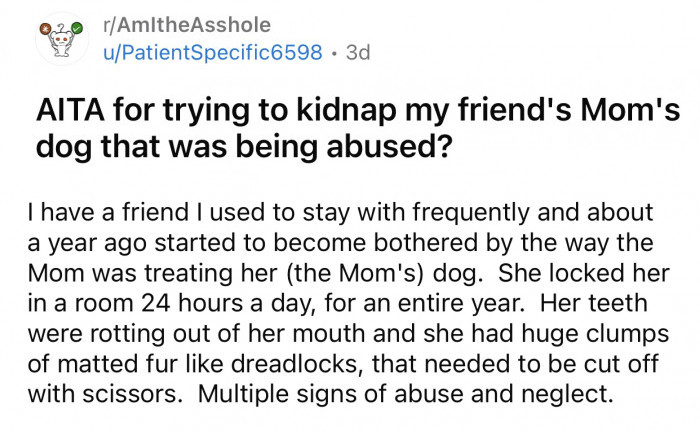
OP complained about the problem previously, but nothing has changed.
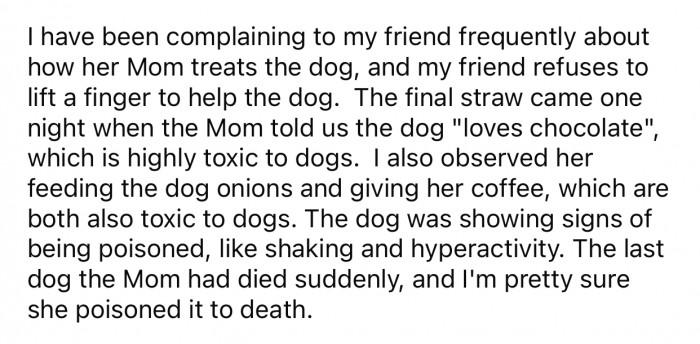
OP didn't want to implicate her friend's mom in other crimes, so she refused to call the police.

The Emotional Toll on Animals
Animal neglect and abuse can lead to profound psychological effects not only on the animals themselves but also on the individuals who witness such acts. Research illustrates that animals subjected to neglect may exhibit signs of anxiety, depression, and even post-traumatic stress disorder (PTSD) as a result of their experiences. According to a study published in the journal Animal Welfare, animals often develop maladaptive behaviors as coping mechanisms when faced with chronic stress and abuse. These behaviors can manifest as aggression, withdrawal, or compulsive actions, further complicating their ability to form healthy relationships with humans and other animals.
This psychological distress in neglected animals can create a cycle of suffering, where the animal's behavior exacerbates the neglect it faces, leading to even greater isolation and trauma.
OP eventually gave the dog back but was still unsure about her actions.
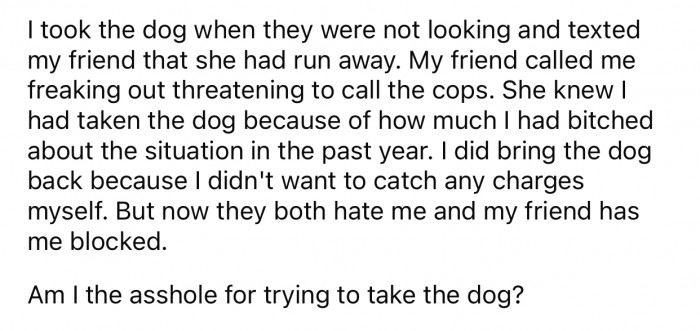
Here's how the Reddit community reacted to u/PatientSpecific6598's post:

OP could have gotten into a world of trouble if she had opted for that route.

The phenomenon of bystander apathy, where individuals fail to intervene in emergency situations, can shed light on the behavior of those who notice animal abuse but do not report it. A classic study by Darley and Latané in 1968 found that the presence of multiple bystanders decreases the likelihood of any one individual taking action, as they assume someone else will step in. This is particularly relevant in cases of animal neglect, as individuals may feel uncertain about their responsibility or fear potential repercussions for intervening.
Understanding this psychological dynamic is crucial for developing community programs that encourage proactive behavior in reporting animal abuse. Empowering individuals with knowledge about their role as witnesses can help combat the bystander effect.
OP felt as if her actions were justified.
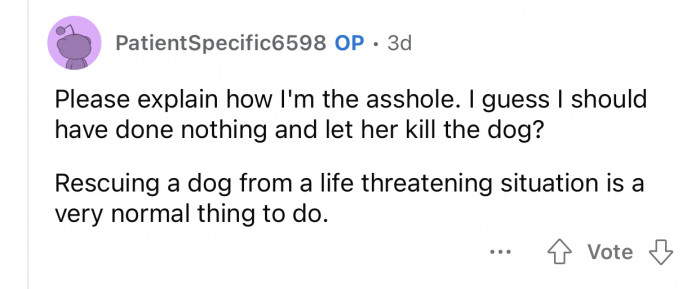
After the kidnapping, OP would have been in much more trouble.

That dog still needs help and will remain neglected.

The Role of Empathy in Animal Welfare
Empathy plays a pivotal role in motivating individuals to act against animal cruelty. Research shows that higher levels of empathy are correlated with an increased likelihood of reporting abuse and advocating for animal welfare. As noted by Dr. Daniel Goleman, an emotional intelligence expert, "Empathy is the foundation of compassion, and when we connect emotionally with animals, we are more likely to intervene on their behalf." Individuals who have a strong emotional connection to animals are more likely to perceive their suffering as significant and worthy of intervention.
Developing empathy can be fostered through educational initiatives that encourage emotional engagement with animals, such as fostering programs or volunteering at animal shelters. Research by Dr. Angela Duckworth, a character researcher, highlights that "direct interaction with animals significantly enhances empathetic feelings towards them, which can lead to more active advocacy for their welfare."
Trying to educate the mom would have been the way to go.

OP committed a crime to prevent another crime from continuing to happen.

OP tried her best not to implicate the mom in more trouble.

Understanding the psychological motivations behind animal cruelty is essential for prevention and intervention. Studies indicate that individuals who abuse animals often exhibit antisocial behaviors and may have experienced trauma or neglect themselves. A meta-analysis published in Trauma, Violence, & Abuse suggests that early exposure to violence significantly increases the likelihood of engaging in aggressive behaviors toward animals.
This insight emphasizes the importance of early intervention programs aimed at at-risk youth, providing them with emotional support and coping strategies that can reduce the likelihood of future violence towards animals. Programs that incorporate animal-assisted therapy have shown promise in this regard, helping to build empathy and emotional regulation skills.
"Comments are not written to help anyone."

OP should get the authorities involved and distance herself from the problem.
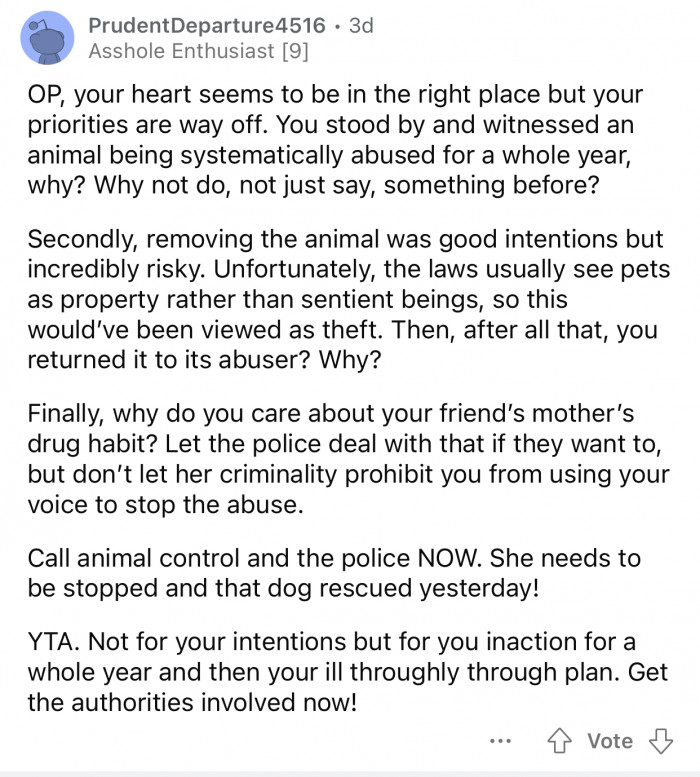
Theft is wrong no matter what the intention is.
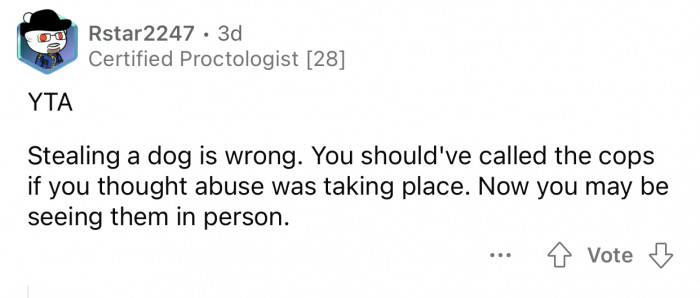
Reporting Systems and Community Engagement
To effectively combat animal neglect and abuse, community engagement and robust reporting systems are crucial. Studies indicate that communities with active reporting mechanisms for animal welfare issues see higher rates of intervention and lower instances of abuse. According to research published by the ASPCA, clear communication about how to report suspected abuse, combined with community outreach initiatives, can empower citizens to take action.
Creating public awareness campaigns that highlight the signs of neglect and the importance of reporting can foster a culture of vigilance and care towards animals. Additionally, community workshops that educate residents on their rights and responsibilities regarding animal care can further strengthen this engagement.
The dog issue could have implicated the mom in more crimes.

Now it's their turn to be nice and not call the cops.

OP has no right to enforce the law.

The psychological impact of witnessing animal neglect can be profound for individuals, especially for children. Research suggests that exposure to animal cruelty during formative years can lead to desensitization to violence and increased aggression in later life. A study from the Journal of Interpersonal Violence found that children who witness animal abuse are more likely to develop antisocial behaviors and have difficulty forming healthy relationships.
To mitigate these effects, it is essential to provide emotional support and counseling to witnesses of such abuse, particularly children. Programs that include discussions about feelings and appropriate channels to express concern for animals can foster resilience and empathy in young individuals.
OP should have acted faster than she did.

The legal way is always the best solution.
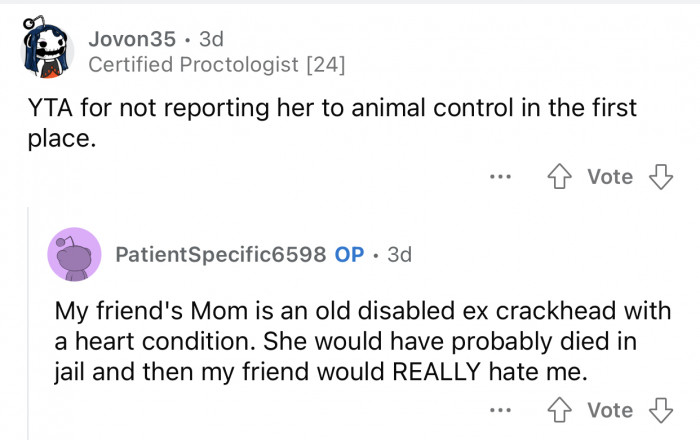
OP didn't fix anything by kidnapping the dog.
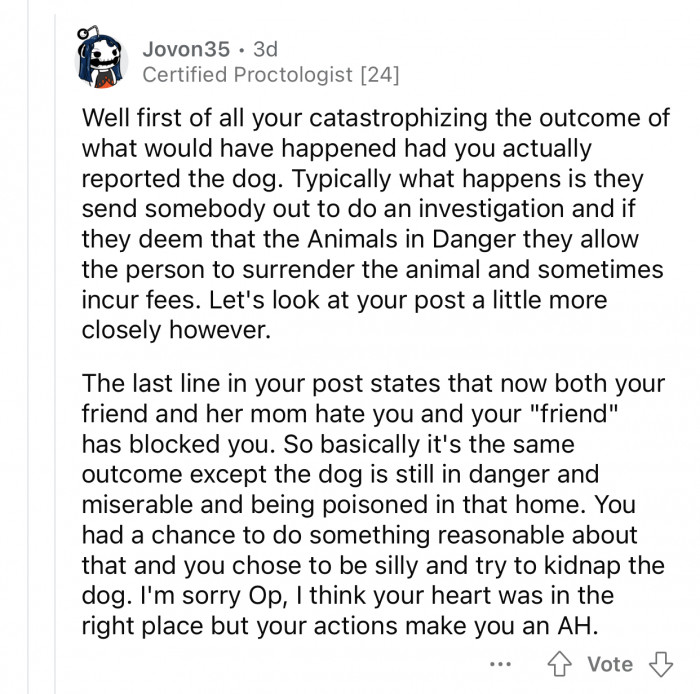
Legal Aspects and Psychological Consequences
Legal systems play a critical role in addressing animal cruelty, but the psychological implications of these laws are often overlooked. Research indicates that individuals who witness the legal consequences of animal abuse may experience a sense of relief and empowerment, but also potential trauma from the emotional distress of the situation. According to the Animal Legal Defense Fund, effective legal frameworks not only serve to punish abusers but also act as a deterrent for future incidents.
Implementing restorative justice approaches, which focus on rehabilitation and reconciliation rather than purely punitive measures, can provide psychological benefits for both the abuser and the community. This approach encourages accountability while also addressing the underlying issues that contribute to abusive behaviors.
OP could have tried to find a better solution to this problem. Her heart is in the right place, but kidnapping someone's dog is a crime, and she could have gotten into trouble.
OP should get the authorities involved and warn her friend about it so they would have enough time to hide the drugs. If you enjoyed reading this, make sure to check out similar content on our platform.
Psychological Analysis
The Redditor's attempt to take her friend's dog highlights a powerful mix of empathy and moral distress, a common reaction when witnessing neglect or abuse. This behavior can stem from a strong emotional connection to animals, where individuals feel compelled to act, even if that means crossing legal boundaries. It’s crucial to recognize that while the motivation to protect is admirable, effective intervention often requires engaging the proper authorities to ensure both the animal's and the individual's well-being.
Analysis generated by AI
Behavioral Analysis & Pathways Forward
Understanding the complexities of animal cruelty through a psychological lens reveals that interventions must address emotional, social, and legal dimensions. As highlighted by research from Harvard Medical School, effective solutions require a multi-faceted approach that fosters empathy, community engagement, and legal accountability. Furthermore, trauma-informed care for both affected animals and witnesses is essential to break the cycle of abuse and promote healing. Ultimately, by combining psychological insights with community action, we can create a safer and more compassionate environment for animals and their caretakers.



